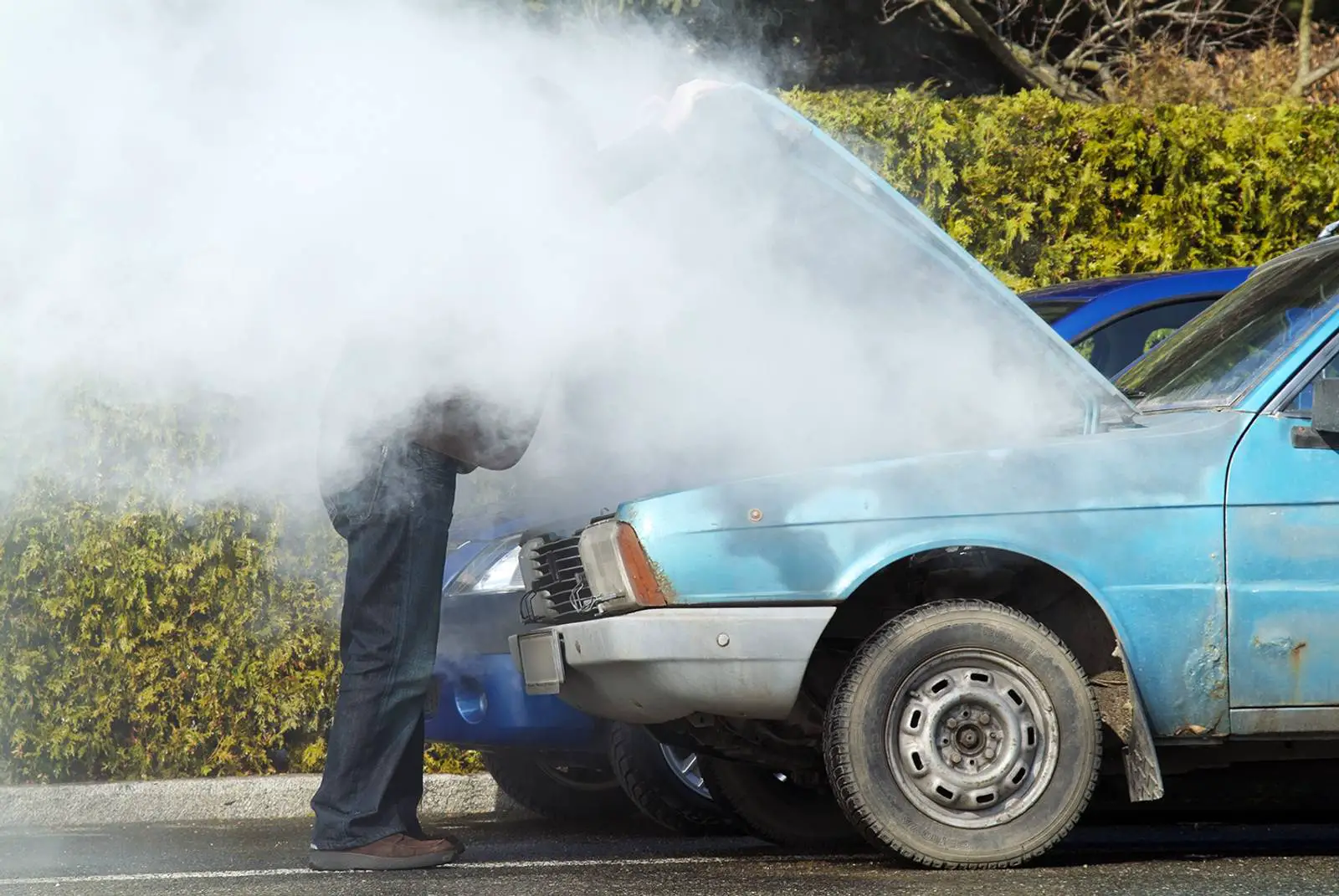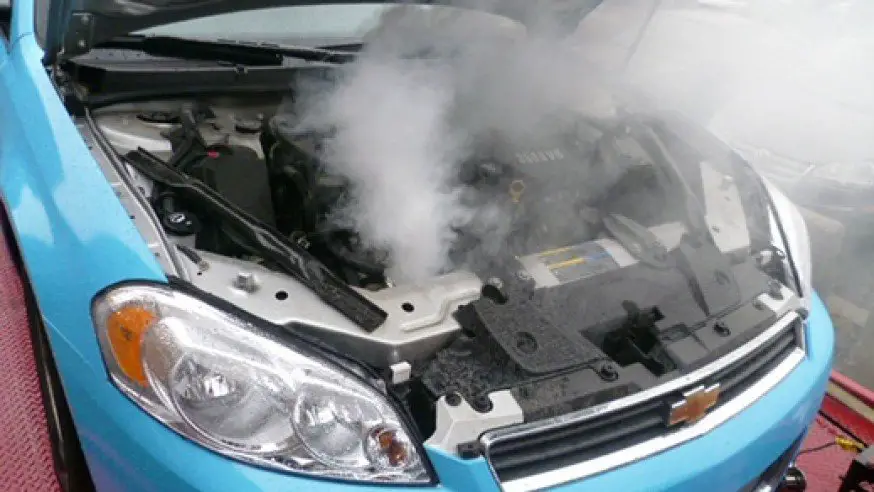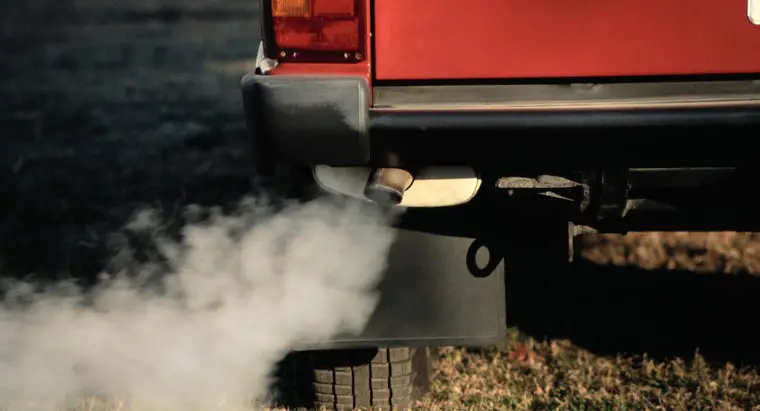Drive To A Service Station
Adding coolant does nothing to address the problem that caused your engine to overheat in the first place, but it often allows you to drive safely to the nearest repair station. A professional will need to inspect your cars cooling system, says Reina. While driving, keep an eye on the temperature gauge. And take notice of everything, like fluid under the car or steam under the hood. This basic information will greatly help in the diagnosis, Reina explains.
Download and print this PDF checklist of what to doand what items to have on handin case of overheating.
Need help on the road? Easily request roadside assistance with the GEICO Mobile app.
Read More: With any car problem, awareness is key. Here are seven car noises you should listen for. And be sure you have the right auto insurance coverage so youre prepared for whatever challenges the open road sends your way!
Peter ferrysays,
Turn The Floor Air Vents On
Most people get in the car and turn the dash board are vents on high to get the air flowing. But youre actually better off directing the air through the floor vents. Hot air rises, so switch to the bottom vents and put your blower on the maximum setting to push that air out. Then, once the car begins cooling, you can open the upper vents again.
How To Fix Overheating Car
There are affiliate links on this article. If you make a purchase through any of the links, I may earn a small commission at no extra cost to you.
Several things can cause your engine to overheat. And as a driver, its your duty to figure out exactly which problem is causing it so you can solve it. In some cases, overheating is something you can tackle on your own without consulting your mechanic.
Sadly, cars tend to overheat at the most unsuitable time, which is usually when youre in haste, and youre stuck in traffic. Suddenly, the needle will start to rise, together with your blood pressure. Its never a fun experience.
In this article, youre going to learn how to fix overheating car. This will help you to better understand your vehicle and be ready for the event of your car overheating.
- Blocked air inlet to radiator
Don’t Miss: Hail Dents Removal
What Happens When Your Car Overheats
It’s not an unfamiliar sight. You’ll see a car speeding down the road with what at first appears to be smoke coming out from under its body. Initially, you might wonder why the driver doesn’t grasp that his car is on fire. But it isn’t on fire, and that’s not smoke from a fire but vapor coming from its overheated cooling system. Most likely, there’s a leak in the cooling system somewhere, and that leak could quickly lead to an overheated engine. In turn, an overheated engine could lead to a massive expense.
In all types of cars, the engine is the costliest “system.” Overheating can leave it beyond repair in a matter of a few ill-timed seconds. Naturally, you might wonder: What happens when your car overheats? Before we get to the final answer on that, though, let’s examine why engines overheat in the first place.
What Happens When A Car Overheats

Basically, as the coolant temperature in your car rises the Engine Control Unit, the computer running the car engine will start taking some precautionary measures to protect the engine.
While this is happening, the ignition timing will reduce, and the amount of fuel injected into your engine will increase.
These measures will, to a small amount, minimize the amount of heat generated, but will significantly prevent detonation or knock from destroying the crankshaft, pistons, bearings, and rods to death.
Read Also: Arizona Mvd Duplicate Title
Car Still Overheating Get The Problem Fixed
Even if adding coolant when your car is overheating brings the temperature down, it likely wont fix your initial problem. Your car may have a leak in the cooling system that will rear its head again a little further down the road. A leaky hose could eventually become a blown hose that keeps you from driving at all.
Theres also the possibility that its not your coolant system at all. You may have a faulty water pump, a crack in your radiator, problems with a belt, low oil, an incorrect air-to-fuel ratio, or a failing thermostat. Take your vehicle to a service station as soon as possible to have the problem diagnosed so a qualified mechanic can repair it and you can safely be on your way.
Why Does My Car Overheat In Stop
If your car is overheating in stop-and-go traffic, but is not doing so on the highway, it’s a good indication that there’s a problem with the cooling fan. Modern cars are equipped with an electric radiator fan that moves air through the radiator and cools down the antifreeze inside. When traveling at higher speeds, there is enough airflow across the radiator that the fan typically isn’t necessary. That’s why the engine temperature rises when you’re stuck in traffic.
Read Also: How To Protect Car From Hail
Major Causes And How To Fix Them
Below are five of the most common causes, and their solutions.
- A Leaky Cooling System
Without a functioning cooling system, its easy for an engine to become overheated. When coolant leaks away, the engine is insufficiently cooled. Air enters the system through the breach, causing a bubble of hot air to form. These leaks can be the result of a puncture, or general wear and tear. Your mechanic should be able to fix a leak fairly easily, by patching up or replacing the faulty component, which is often as simple as replacing the coolant tank.
- A Blockage in the Cooling System
Ironically, these blockages tend to occur in cold weather. Poor quality coolant solidifies in cold conditions, causing a blockage in the system that prevents the coolant from properly circulating. Mineral deposits or a foreign object in the system can have a similar effect. This can usually be fixed fairly easily by draining and flushing the system, before replacing the coolant.
- Low Oil
- An oil leak
Go Through The Motions
Lets go back to the reasons your car can overheat. You can check man of those on the road on your own.
First, check your coolant level as described above. If you dont know where your coolant reservoir is, check your owners manual or use Google. If the coolant levels look good, move on.
While the hood is up, check on your hoses, particularly the upper and lower radiator hoses. Look for disconnected hoses, punctures or potential blocks.
Don’t Miss: How Much Horsepower Does My Car Have
What Can Cause A Car To Overheat
To know exactly what to do if your car is overheating you must also know what can cause a car to overheat. Here are the common reasons for a car to overheat:
- Coolant is being circulated incorrectly.
The engine will overheat if the water/antifreeze mixture is not circulated properly. This mixture keeps your engine cool in the summer and prevents it from freezing in the winter. To avoid this, make sure to check it on a regular basis. Even if there are no leaks, it can evaporate over time. To cool down your engine and get you to an auto shop, add about half a cup of water to a low antifreeze tank.
- A Leak
What to do if your car is overheating involves checking for a leak. If your water/antifreeze levels are constantly low, there is a leak somewhere in your cooling system. If you are experiencing this, please contact us right away. We’ll locate the leak and provide you with an affordable repair estimate.
- A hose must be replaced.
The hoses that circulate your coolant may become clogged or detached over time. While it may not be completely blocked, even a partial blockage can prevent enough coolant from circulating. Again, we can check for this during an inspection here in our shop.
Other Issues:
In most cases, it is best to bring your car to an auto mechanic as soon as possible so that they can identify problems and help you avoid more expensive repairs down the road.
The Causes Of Cars Overheating
There are many reasons why your car may have overheated, and inefficiencies in cooling are often the primary cause of issues. Your cooling system is integral to the successful operation of your engine. Your cooling system works to disperse heat from your engine through the circulation of coolant or antifreeze. Your vehicles cooling system is particularly complex, and uses a radiator, heater core, thermostat, water pump and hoses as well as the engine itself to fulfil its vital role.
Leaks within your cooling system are common reasons why your engine may be overheating. Leaks not only prevent coolant circulating but also let air into the system. The presence of air within the cooling system causes airlock to occur, and as a result large bubbles that cannot be pushed through the system materialise. Coolant flow can be dramatically inhibited by airlock, which means heat that should be dispersed stays inside the engine. Blockages within your cooling system have a similar effect, with the lack of circulation causing the engine to overheat. Blockages are commonly caused by mineral build up and the presence of foreign objects.
Also Check: How To Transfer Car Title In Arizona
What To Do When Your Car Engine Is Idling
Idling issues can be frustrating, but with some patient troubleshooting, youll have a real chance at figuring it out. Remember to always check your engine idle with the air conditioning and defroster turned off, as both of these systems are designed to change the idle when they are on due to the demands they place on the engine.
Do You Know If Your Car Is Running Hot But Not Overheating

Most drivers look at their temperature gauge so rarely that many vehicle manufacturers dont even include temperature gauges any more but just lights that will come on if your car is either extremely cold or extremely hot. However, if your car is running hot but not overheating, you might not know it without a gauge.
Also Check: How To Make Car Freshies
The Top 5 Causes Of Car Overheating
Most auto experts say that damage to the mechanical components of the vehicle will occur if the engine becomes hotter than 240°F. The temperature gauge will indicate the engine is too hot and you should see the engine warning light come on your dashboard. There may even be steam rising out of the engine if it gets too hot. This all indicates that something is preventing the engine from being cooled.
Read also: Top 5 Causes of a Car Misfire: The Most Common Issues
Below are the top 5 causes of car overheating.
Also Check: Can I Turn In My Car Lease Early
What Should I Do If My Radiator Is Overheating
Also, check between the condenser and the radiator as this tight spot can hold a lot of debris. A self-service car wash hose can clean out a lot of debris, just dont get too close to the fins of the radiator and damage them or flatten them down. Your electric fan needs to turn on at certain times to keep your vehicle cool.
Recommended Reading: Removing Hard Water Stains From Car
What Does The Temperature Warning Light Mean
If the temperature warning light on your dashboard a small picture of a thermometer comes on, that could mean your coolant levels are low and could be your first sign of an overheating engine.
When its safe to do so, pull over and check your coolant levels, topping up if necessary.
If the temperature gauge on your dashboard has moved into red let your engine cool down for at least 30 minutes before continuing.
If the light comes on again, this could be symptomatic of an issue with your cooling system, so check your car into a garage and get it seen to as soon as possible.
Why Is The Engine Coolant System So Important
This question is perhaps a nuisance but I guess a few words of introduction wont hurt.
Anyway, the inner combustion engine produces a lot of heat while running. If that wasnt controlled by the coolant system, the engine would overheat and get damaged.
So, proper engine cooling is at the same level of importance as proper engine lubrication .
If youre interested in exactly how the coolant system works, for a great explanation on Wikipedia.
Read Also: Club Car Serial Number Chart
A Rising Temperature Gauge
If the temperature gauge on your dashboard is creeping higher, then thats a sign of an overheating car. While your car will run hotter during warm weather, if the gauge hits the red zone or warning lights illuminate, then your engine is overheating.
Most older vehicles have a needle gauge showing an approximate temperature with an upper limit marked in red on the dial. Some newer vehicle models lack this needle gauge and instead utilize a warning light to alert you when your engine temp is above safe operating temperatures.
Another feature found on some newer vehicle models is limp mode. This self-protective setting may turn on if sensors indicate the car is overheating. Once the computer system activates limp mode, it will reduce the power to lessen the load on your engineyoull still be able to drive the car, but it will feel underpowered and sluggish.
Coolant That Is Low Or Contaminated
As its name indicates, coolant helps keep your engine cool. It circulates through the cooling system, absorbing excess heat from the engine, getting cooled down in the radiator, and repeating the cycle again. If the coolant is too low, or if contamination has been introduced, it could cause the engine to overheat when you’re in traffic.
You May Like: Car Hail Blanket
Why Would A Blown Head Gasket Cause Overheating
The coolant in your vehicles engine serves an important purpose: it removes heat from your engine. This heat is created during the combustion process, as your engine fires and ignites the fuel and air mixture that makes the pistons move up and down. Some early engines didnt have coolant and instead relied on air to cool the engine. Modern engines are much more high-performance than traditional air-cooled engines and require efficient cooling systems to keep them running at the right temperatures.
Your head gasket is an important component in your cooling system. It not only creates a seal between your engine block and head, it also channels coolant for optimal engine cooling. A blown head gasket can allow coolant to either enter your engine, where it is burnt off or leaks out of your engine onto the ground. In both cases, you can starve your engine of the coolant it needs, allowing overheating and permanent engine damage. Blown head gaskets arent something you want to ignore for any length of time.
A head gasket leak needs to be repaired as soon as its detected. There are several signs that you have a blown head gasket:
- Low coolant level in your coolant overflow tank
- A cloud of white smoke coming out of your tailpipe
- Coolant pooling on the ground when youre parked01
You can choose from a variety of products, each designed to stop leaks and restore your cooling system performance:
Do Not Try To Open The Hood Of Your Car Until The Vehicle Has Cooled Down

Once the vehicle is at a complete stop and turned off, do not lift the hood. Depending on how long the vehicle has been running, the coolant in the vehicle could be increasing in temperature to an extremely hot level, and essentially pressurizing in the cooling system itself. Only once the vehicle has completely cooled down will it be suitable to attempt to open the hood. The vehicle should be allowed to cool down naturally before opening the hood.
To confirm that the vehicle has appropriately cooled down, monitor the temperature gauge in your vehicle as it moves from HOT to COOL, which may take upwards of 30 minutes. Depending upon the vehicle you drive, the temperature gauge may only be functional when the ignition is in the accessory or on position. During this step, its important to not start the engine, and in this situation, only activate the ignition to the on position to read the temperature gauge.
Read Also: What Kind Of Car Did Columbo Drive
How To Fix An Overheating Car Engine
While there might be many problems that can lead to an overheating engine, you can keep it from getting overwhelming if you KISS the problem. Its what every mechanic instructor teaches, keep it simple stupid.
Its the mechanics version of Occams Razor. Start with the simplest and most likely problems before you jump down the rabbit hole and start tearing things apart. When troubleshooting an overheating engine, the simplest thing to check is your fluid levels.
Car Overheating: What Causes It And How To Fix It
Car engines are designed to operate around 210 degrees Fahrenheit and require a fully functioning cooling system to prevent the engine from overheating. Your first indication of overheating may be steam coming from underneath your cars hood, your cars temperature gauge going to H or the heat light illuminating on your cars dash.
Those indicators may mean expensive damage has occurred, or is about to.
Recommended Reading: How To Remove Scratches From Cars Paintwork